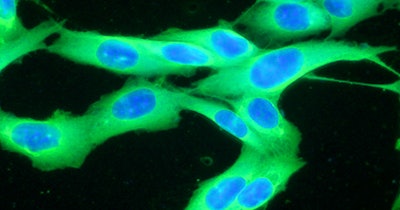
Scientists have voiced fresh hopes for metastatic skin cancer therapy after identifying a way to kill melanoma cells efficiently and selectively while sparing normal cells, according to a recent study.
A cell-penetrating peptide related to the protein p-16 was found in laboratory studies to kill human melanoma cells while being less toxic to normal human melanocytes and nontoxic to human fibroblasts.
“We tried the p16 peptide on three lines made up of metastatic melanoma cells. All of those were nicely wiped out, which is very promising,” Professor Dot Bennett, a British Skin Foundation researcher and co-author of a new study published in Biology Open, said in a statement.
“Although a great deal of extra work needs to be done before we can think of using this on human patients, it is very encouraging,” she said.
Three charities funded the study: the British Skin Foundation, Age UK and Cancer Research UK.
More people than ever are surviving melanoma skin cancer, but there is a gap in survival between people diagnosed at early stages and those diagnosed later; furthermore, options are limited for patients with metastatic disease.
A p16-derived peptide killing melanoma cells has been reported before but the effects on normal cells versus malignant cells have not been compared, nor the mechanism of action of the peptides elucidated, say researchers.
As the great majority of melanoma cells have lost p16 function, restoration of p16 to them is seen as a promising avenue for therapeutic cell senescence, a state in which cells can no longer divide.
The researchers say the use of “designer” peptides, small peptides that mimic part of a desired protein, and which can have highly specific effects, has been relatively underexplored.
Bennett, who is a professor at the Molecular and Clinical Sciences Research Institute, St. George’s, University of London, recently told the Guardian newspaper how she and colleagues made changes to a peptide that previous research by other scientists showed might be effective that would allow it to enter cells, then added the peptide to melanoma cell lines in the laboratory.
The British Skin Foundation said the peptide works by activating a molecular “switch” which normally causes cells to stop dividing permanently before they start growing out of control, forming a harmless mole. When this switch is broken, it allows cells to grow out of control and become cancer.
In the lab, the scientists gave different concentrations of the p16-related peptide to lab-grown human metastatic melanoma cells, normal skin-pigment cells, and fibroblasts, cells which play a vital part in skin repair and regeneration. The peptide killed almost all melanoma cells along with a few normal pigment cells, and didn’t kill any fibroblasts. The study reported these results as the efficient apoptotic killing of 3/3 lines of human metastatic melanoma cells by a 28-mer p16-based cell-penetrating peptide, at 30 µM or less, over five days.
There will need to be further lab-based tests to see if the peptide can leave more kinds of healthy cells intact and to reveal the cancer-killing mechanism it triggers. If these were to prove successful, clinical trials would be needed to assess how the peptide performs against current treatments for melanoma, or jointly with these treatments, say the researchers.
"With melanoma skin cancer cases projected to rise by around 50% over the next 20 years, research like this offers new hope that we can beat melanoma for good,” said Michelle Mitchell, CEO of Cancer Research UK.



















